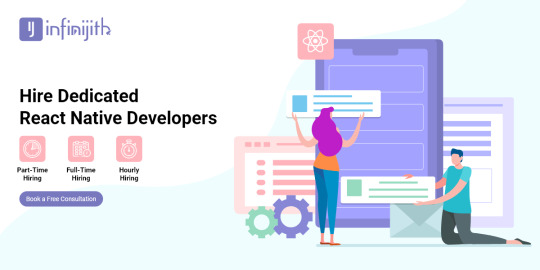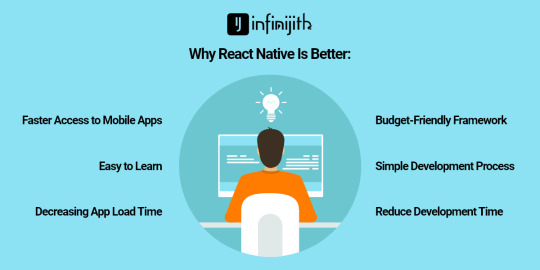#ReactNativeframework
Text
React Native Guide: A Hybrid Framework for Mobile Apps

Everybody is searching for easier and quicker ways of making mobile apps that work on both iPhones and Android phones. This is where React Native proves to be useful! It’s a tool made by Facebook that assists developers with making portable applications utilizing basic coding languages, such as JavaScript and React.
With React Native, developers can compose the code once and have the application work on both types of phones. In this blog, we will explore what makes React Native exceptional, why individuals like using it, and how it’s essentially altering the way mobile apps are made. Subsequently, whether you’re contemplating making an application, a developer who loves learning new things, or just someone curious about development, this blog is for you!
What is React Native?
React Native is a JavaScript framework designed for building natively rendering mobile apps for iOS and Android platforms. Born from the genius labs of Facebook, it’s based on React, Facebook’s JavaScript library for building user interfaces, but targets mobile platforms instead of browsers. Essentially, with React Native, you can build mobile apps using only JavaScript and a few native components. The best part? It’s not about building a “mobile web app” or even a “hybrid app” but truly native apps.
Why Opt for React Native?
Cross-platform Development- The primary allure of React Native is its cross-platform capabilities. Write the code once, and run it on both Android and iOS. This capability can considerably reduce development time and costs.
Performance- While there are several hybrid solutions out there, what sets React Native apart is its closer proximity to native performance. This is because it uses native components rather than relying on WebView for rendering.
Community Support- Being an open-source project, React Native enjoys significant community support. Developers across the globe contribute to its repository, ensuring a plethora of plugins, modules, and extensions are readily available.
Live and Hot Reloading- One of the features developers love is the ability to immediately see the result of the latest change. React Native’s ‘Live Reloading’ and ‘Hot Reloading’ features refresh and reload applications instantly, making development a breeze.
Flexibility for Developers- Since it’s based on JavaScript, which is widely known among developers, transitioning to React Native becomes simpler for those already familiar with JS or React.
There are two approaches in the world of mobile app development – Native and Hybrid
native and hybrid (or cross-platform), each with its own advantages and disadvantages. React Native actually falls somewhere between these two approaches, offering a balance between performance and development efficiency.
Native App Development
Native app development involves building applications for specific operating systems, primarily iOS or Android, using programming languages and tools that are native to those operating systems.
Languages
Swift or Objective-C for iOS.
Kotlin or Java for Android.
IDEs (Integrated Development Environments):
Xcode for iOS.
Android Studio for Android.
Advantages
High Performance.
Access to all native APIs and device features.
Better user experience with platform-specific UI/UX guidelines.
Disadvantages
Separate codebases for each platform.
More time-consuming and expensive.
Hybrid/Cross-Platform App Development
Hybrid app development enables developers to write the code once and run it on multiple platforms, leveraging web technologies.
Languages: JavaScript, HTML5, CSS.
Frameworks: Cordova, Ionic, Flutter, React Native.
Advantages
Single codebase for multiple platforms.
Faster development and reduced costs.
Easier maintenance and updates.
Disadvantages
Potentially lower performance compared to native apps.
Limited access to some native APIs and features.
React Native
React Native combines aspects of both native and hybrid app development. While it allows developers to write most of their code in JavaScript and reuse it across platforms, it also enables the incorporation of native code when necessary for performance optimizations and access to native features.
Advantages
Near-native performance.
Single codebase for iOS and Android.
Access to native modules and APIs.
Large community and ecosystem.
Disadvantages
Some complex features might require native development.
Still not as performant as purely native apps in some cases.
Choice Between Native and Hybrid
The choice between native and hybrid development depends on various factors including:
Project Requirements: Native might be suitable for apps requiring high performance and access to advanced device features. Hybrid could be beneficial for simpler apps or those requiring quicker, cost-effective development.
Budget and Resources: Native development can be resource-intensive due to separate codebases for each platform, while hybrid development can be more cost-effective.
Development Timeframe: Hybrid apps can generally be developed more quickly due to a single codebase approach.
Maintenance and Updates: Managing updates and maintenance is generally easier with a single codebase in hybrid development compared to maintaining separate codebases in native development.
React Native in the Real World
Many globally recognized companies trust React Native for their applications. Facebook, of course, uses it for its app. Instagram, Airbnb, Walmart, and Tesla are among the heavyweights who leverage the power of React Native, a testament to its robustness and versatility.
Challenges with React Native
However, it’s worth noting that while React Native is powerful, it isn’t a panacea. There are scenarios where it might not be the ideal choice:
Complex UI/UX Designs- For apps requiring intricate animations, interactions, or transitions, native development might be more suitable.
Native Modules Requirement- If an app requires several native modules, using React Native can become complicated, necessitating developers to write platform-specific code.
Heavy Computation Apps- For CPU-intensive operations, native code can be more efficient.
The Future of React Native
React Native has been continuously evolving since its inception. With Facebook’s backing and the vibrant community around it, there’s a significant focus on making it more performant, versatile, and developer-friendly.
Moreover, the trend towards adopting hybrid frameworks is growing, given the speed of development and cost savings. Given these trends, React Native seems poised to remain a popular choice among developers and businesses for the foreseeable future.
Conclusion
React Native has solidified its position as a top hybrid framework. Its capacity to convey close-to-native performance joined with the advantages of cross-platform development, makes it a convincing decision for some undertakings.
In any case, likewise with any technology, understanding its strengths and limitations is fundamental. React Native offers a lot, but it’s crucial to determine if it aligns with the specific needs of a project. For many, it provides the right balance of performance, flexibility, and speed, making it a go-to choice in the world of mobile app development.
Mobile App Development with React Native Frequently Asked Questions
Why hybrid apps are the future of mobile development?
Hybrid apps are the future of mobile app development as they allow for faster, cost-effective development with a single codebase for multiple platforms, thereby addressing diverse user needs and improving reach. Additionally, advancements in hybrid app frameworks are continually narrowing the performance gap between native and hybrid apps, ensuring high-quality user experiences.
How can I install React Native?
You can install React Native using Node Package Manager (npm) or Yarn by running the command npx react-native init MyNewProject or yarn create react-native-app MyNewProject, respectively. Make sure to have Node.js and a package manager installed beforehand.
Is React Native performance close to native?
While React Native might not match the performance of purely native apps in some cases, it is generally performant enough for most use cases and can approach native performance with optimizations.
Can I use custom/native modules with React Native?
Yes, React Native provides interfaces to use native modules that are written in Swift, Objective-C, Java, or Kotlin, allowing you to use native code and libraries in your project.
Originally published by: React Native Guide: A Hybrid Framework for Mobile Apps
#Hybridmobileappdevelopment#ReactNativeframework#ReactNativeDevelopment#Hybridappdevelopment#Mobileappdevelopment
0 notes
Text
React Native App Development Solutions

Are you looking to develop a React Native app? Look no further! Our team of experts will help you get your app up and running in no time.
React Native is a great platform for developing apps. Our team has years of experience in React Native app development, and we can help you create a successful app that meets your needs.
A React NativeOur Opencart Experts developers are highly skilled in making any kind of eCommerce websites for your business needs app can be a great way to improve your business. With our help, you can create an app that is both efficient and easy to use.
If you’re interested in developing a React Native app, contact us today for a free consultation. We can help you get started on your project and ensure that it is a success.
#nextbigtechnoloy#reactnative#reactnativedevelopers#reactnativejs#reactnativedevelopment#reactnativeappsolutions#reactnativeapplications#reactnativeframework#mobileapplication#reactnativeapps#appdevelopment
1 note
·
View note
Link
#reactnativeappdevelopmentcompanies The React Native App Development Framework helps developers improve mobile user experience while also speeding up development. It allows developers to construct apps for all platforms (iOS/Android) from a single code base. It provides a slick, smooth and responsive user interface, while significantly reducing load time. The total amount of mobile app downloads will have surpassed 250 billion by 2022.
#react native app developers#reactnativeappdevelopmentcompanies#reactnativedevelopers#reactnativeappdevelopmenttools#reactnativeappdevelopmentcost#howtodevelopwithreactnative#reactnativeappdevelopmentservices#reactnativeframework
0 notes
Link

React acquaints a component model to form your UI. There are two or three different ways of delivering a component/JSX.
You can utilize these simples rules to figure out what direction to compose your segment
It’s feasible to compose components utilizing classes or capacities. When utilizing classes what we do is broaden either React’s Component or PureComponent.
#which component to use in react native#react#reactjs#reactnativeappdevelopment#reactnativeframework
0 notes
Link
It is possible to create an app that offers new UI and UX with React Native framework Development, which is compatible with both iOS and Android platforms.
#react native framework#reactnativeappdevelopers#mobileappdevelopment#reactnativeappdevelopment#reactnativeappdevelopmentcompany#reactnativeframework
0 notes
Link
0 notes
Link
Hire A ReactJS Developer
We specialize in creating web apps using the ReactJS and React Native frameworks across multiple use cases and technologies, including web applications and the Internet of Things. In order to build fast, simple, and scalable user interfaces, our offshore ReactJS developers strive to provide speed, simplicity, and scalability.
0 notes
Link
Facebook, Bloomberg, Instagram, SoundCloud Pulse, Townske, Wix, Gyroscope, Salesforce, and Pinterest are some of the leading businesses that have relied on React Native framework to develop brilliant applications that work on every platform flawlessly and gained immense success.
Here’s how React Native helps the businesses to turn the idea into a reality
#react native app development#reactnative#AppDevelopment#Businesses#MobileApps#ReactNativeFrameworks
0 notes
Text
React Native vs Ionic: Which Is Better?
In this article, we will try to highlight the most important conceptual comparison of React Native vs Ionic.
We will study both the strong and weak sides of RN and Ionic. This will probably give you the knowledge you need to make an educated decision of the stack that will work best for your startup.
Native Apps and Hybrid apps
Before discussing the differences between RN and Ionic, let’s quickly understand what are Native and Hybrid Apps.
Native apps generally build using specific target platforms and language like Swift for iOS or Java for Android etc. We cannot share the code across platforms. These apps are built using HTML, CSS, and JavaScript and execute the same code in different platforms.
The native can access all the features offered by the platforms without any constraint. Hybrid Apps are basically websites embed in mobile apps through WebView. These apps use native features using tools such as PhoneGap and Cordova.
Read More: Native Mobile App vs Web App.
React Native vs Ionic?
Let’s explore both the frameworks in detail so you can easily choose the one for your next startup.
React Native
Facebook launched React Native framework in 2015. It is a cross-platform framework based on JavaScript. Most of the code can be shared across platforms. It allows developers to build enhanced and native-like apps using a single code base.
Ionic
Ionic is a very common hybrid app development framework. It uses web technologies in code and needs PhoneGap or Cordova for the native compilation. Ionic leverages web technologies like HTML, CSS, and JavaScript-based framework.
It is one of the popular frameworks to build feature-rich, advanced and elegant apps.
React Native vs Ionic: Language Stack
Ionic
Ionic is an Angular based framework. It uses HTML for its views. Using Ionic cross-platform development is somewhat easier since much of the basic underlying framework rests the same.
Ionic will give some designers and developers a common ground to work. Whereas, React might involve further work, particularly when co-operating with other team members.
React Native
React Native is based on a JavaScript framework called React. It uses JavaScript code which resembles HTML.
It is something most developers are comfortable with. React native app has smooth UI components for app development.
React Native vs Ionic: Write Once, Run Everywhere
Ionic
A standard hybrid app runs the same code on all platforms. However, in order to give the more native app-like experience, it adapts some behaviors according to the platform.
React Native
RN doesn't allow developers to write once and runs everywhere. However, React Native enables the developer to utilize the maximum customizable options.
React Native vs Ionic: Testing During development
Ionic
Ionic allows previewing your app in the web browser and mobile devices. It immediately refreshes as you make modifications to your application.
React Native
React Native allows to test the application along the way during the development. The developer doesn’t need to recompile and rebuild again and again.
The emulator or a real device shows the result instantly.
React Native vs Ionic: Community and Plugins
While opting for an open source platform, it is very essential to evaluate how vivid the community around it is.
Both Ionic and RN have developed from established ecosystems React and Angular. Both have very good online support ecosystems.
You can easily find information online, answers to your problems, or get bugs fixed.
Ionic
Cordova and PhoneGap are being used for a while so you can get plugins easily. There is also a marketplace where developers offer pre-built Ionic plugins.
Well, React Native has more stars on Github than Ionic. While the former has about 71,0001 plugins the latter has 38,842.
React Native and Ionic both inherit the community they are based on -React and Angular. And both have a very good ecosystem.
React Native
The number of plugins already available for the React Native is huge. There is also a plugin to use PhoneGap or Cordova. With this, you can quickly inherit the hundreds of ready-made plugins from the community.
Which is better?
Of course, React Native and Ionic are both powerful platforms. For the startups who prefer creating native apps, React is more effective. React Native makes apps quicker and more responsive.
Whereas, Ionic is a truly hybrid development platform with more emphasize on speed and usability. Cost and time are usually the reasons startups choose to hybrid development platforms.
Discuss your idea, preferences, and requirements with us. And we at Pentoz will help you to turn your idea into reality!
Read the full article
#cordova#ionic#IonicFramework#phonegap#Reactnative#ReactNativeframework#ReactNativevsIonic#RNframework
0 notes
Photo

Merge with Infinijith to develop your Web, #Android, and #iOS applications. Hire dedicated React Native developers on timely basis like full-time or hourly.
Book a free consultation now: http://bit.ly/2SkITLS
#Infinijith #ReactNativeDevelopment #HireReactNativeDevelopers #ReactNativeFramework
0 notes
Photo

Reasons to Choose React Native for Fintech App Development
With ever-evolving technologies at hand, developing high-performance apps is now just a matter of decision-making, good skills, and optimum resources. While there have been many discussions regarding React Native mobile app development, we believe it’s time we understand whether it works for fintech applications.
#reactnativedevelopment#ReactNativeApps#ReactNativeAppDevelopment#ReactNativeframework#react native developer#react native development
0 notes
Link
reactnative,reactnativeframework,flutterframework,flutter,reactnativedevelopment,flutterdevelopment,
0 notes
Photo

Going to Develop a #MobileApp using #ReactNativeFramework
Then know why #ReactNative is a better #MobileApplicationFramework for #MobileAppDevelopment
Read More: http://bit.ly/39M9aZh
#Infinijith #ApplicationDevelopment
0 notes
Link
0 notes
Link
0 notes